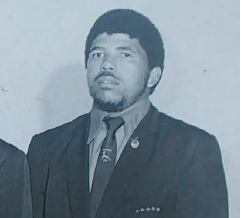In the 10th instalment of a series on black rugby legends, SA Rugby Magazine looks at the career of former Saarb and Saru tighthead prop Broadness Cona.
EARLY LIFE
Broadness Cona was a few weeks away from his 70th birthday when SA Rugby magazine visited him at Lingelihle Hostel in Gugulethu, Cape Town. He still glowed with the effervescence of a passionate activist serving his community.
Broadness (real name Broadhurst) was born in Simon’s Town. His migrant-labour parents, Morgan and Mariah, hailed from the Eastern Cape. He does not recall the exact date when they arrived in Cape Town, but alludes to the period between 1935 and 1940.
Cona’s parents worked on the Simon’s Town dockyard; Mariah as a cleaner and Morgan as a stevedore. He is one of five children and the only son.
They grew up in Luyolo township in Simon’s Town and received mostly informal schooling at the local Presbyterian and Methodist churches. Neither his mother nor his father played any sport and he was the first and only one of his family who did so.
Cona explains how he got the name of ‘Broadness’.
‘My father learned to speak English from the visiting sailors, which saw him speaking the language like the English and being given the nickname “Black Englishman”.’
When he was born, his father named him ‘Broadhurst’, a proper English name. However, when he turned 16 and applied for his reference book (dompas) at the Department of Home Affairs in Observatory, the clerk registered his name as ‘Broadness’.
‘The clerk was extremely arrogant and would not accept that “Broadhurst” could actually be my name,’ he recalls.
RUGBY CAREER
In 1965, the Cona family was forcefully removed from Simon’s Town because of apartheid’s Group Areas Act and dumped in Gugulethu. Ironically, this political act set the wheels in motion for Broadness’ rugby career.
‘I played my first match at age 22 when my boxing friend Joseph Hali convinced me to try out for the Flying Eagles Rugby Club in Nyanga,’ he says with a smile.
Gugulethu did not have a rugby club at the time and the young Cona, a passionate soccer player, trained at the local boxing club, where he met Hali. One of Flying Eagles’ star players, Norman Mbiko (who went on to be selected for the South African African Rugby Board team with Broadness) played soccer on Saturdays and rugby on Sundays. This arrangement suited Cona and he became a member of the Flying Eagles rugby family.
Other rugby greats, like former Saarb captain Thompson Magcala, encouraged the rookie to specialise as a tighthead prop because of his strong upper body.
‘Thompson played a big role in me staying in the game, as he would always encourage me when I became despondent,’ says Cona.
He made an immediate impression and was selected for the

Saarb national side to play in his first ‘Test’, against the South African Coloured Rugby Board (SACRB) in 1970.
After the dismantling of Saarb in 1971, he played under the banner of the South African Rugby Association (Sara) from 1971 until 1976. Cona fondly recalls the Leopards tour to Italy in 1974, during which he played in two ‘Tests’ against the Italian national side and two other tour fixtures. After the 1976 political unrest in South Africa, he was part of the exodus from Sara to the South African Rugby Union (the then non-racial Saru rugby structure). His beloved Flying Eagles split into two clubs, divided between rival rugby structures. Cona would play for the Western Province Rugby Board, an affiliate of Saru. He was selected for the Saru invitation team that played against the Saru national team in 1978 and 1984. He retired in 1986, at the age of 39.
LIFE AFTER RUGBY
Cona married Nonceba and they had two sons. After his retirement from the game as a player, he stayed involved through the Lagunya Rugby Club, where he assisted his long-time friend and coach of Lagunya, Norman Mbiko.
However, the bitterness between erstwhile teammates because of the National Sport Council/South African Council of Sport ideological battle became frustrating and he left the game soon after.
As a provider for his family, Cona worked for the Western Province Blood Transfusion Service for an incredible 45 years, first as a driver and later as transport co-ordinator for the service in the Western Cape. He retired in 2007 and has since immersed himself in serving his community through the South African National Civic Organisation structures in Gugulethu.
– This article first appeared in the December 2017 issue of SA Rugby magazine





